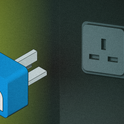A woman and child protest against climate change in New York. Photo: PA
It is plain to all of us that climate change is a global challenge, but each one of us can feel like just one speck in the huge mass of humanity. Is there really anything meaningful that any one of us can do to help? It’s a fair question.
And even more so when we contemplate the harsh reality that so far climate change—to take just one example of our species’ enormous impact on our ever-more-fragile planet—has so far proved totally immune to any of the talks, resolutions, targets or actions of people, businesses or governments.
To spell that out, the carbon emissions curve is still rising year on year exactly as it was doing before climate change ever hit the headlines. At the global level, there is still zero detectable evidence of human governance.
So much for the bad news—now, for some evidence-based and well-founded hope. Firstly, our failure so far to have agency absolutely does not prove that having agency is not possible in the future.
Secondly, the simple act of facing the stark realities that I’ve outlined is an essential and incredibly helpful step in the quest for an effective course of action. The knowledge that nothing so far has worked at all gives us key information about the nature of the challenge—and we can use this to guide our efforts.
It turns out that not only can humans get on top of the problem, but also that there is plenty all of us can do as individuals—far more in fact than most of us imagine.
Cutting the impact of our own lifestyles is still an important part of the equation. It demonstrates our commitment, it sets a culture and it brings authenticity to the other essential actions we take to exert influence in every part of our lives.
Understanding the challenge
First, though, let’s analyse the problem a little further, because this will help us target our efforts. Why is it that the individual efforts of people, businesses and nations have proved not just insufficient, but have actually added up to zero?
It boils down to the balloon squeezing effect—otherwise known as “rebounds.” At the moment, the way things are working is that if we cut the carbon in one place, the emissions are simply migrating to some one or some where else. When one country’s emissions go down, another’s goes up.
When a person has avoided a flight, the airline has sold the seat to someone else. Someone buys a smaller car, but the marketing effort has simply shifted to a different customer group.
Somehow, we must intervene to interrupt the global dynamics of rising emissions. We need whole system change. We need an arrangement to leave the world’s fossil fuel in the ground. And for that to be possible, we need political will. And for that to be possible, we need cultural shift and widespread insistence. And that is where all of us come in.
So the question we all need to be asking is, “Given who I am, what can I do to help create the conditions under which the world can agree to leave the fossil fuel in the ground?”
Here are the answers as I see them.
Five things to change
For most people their carbon footprint falls into about five core areas:
- Food: Reduce meat and dairy, especially beef and lamb, cut waste and avoid air freight
- Household energy: Cut the electricity and gas consumption. Fit solar panels if you can. Enough said.
- Travel: Fly less and cut car emissions by driving less and in an efficient, ideally electric car.
- Stuff: Buy less, keep it working for longer, and pass it on when you are done with it.
- Money: Keep investments fossil free, not least pensions.
Make sure all politicians know you expect coherent and strong climate policies. Make sure you expect your workplace to make a serious response. Buy from carbon conscious companies; let them know you are on the lookout for greenwash and that you are not stupid.
If you hear someone denying either climate change or the requirement for personal action, wherever you hear it, challenge it. Do so with a smile on your face if you can, but don’t let it go. Support those who take action.
The values we should adopt
Going one level deeper into the question of what it will take to bring about the system change that we need to see, here are three values that I think humanity needs to adopt and live by as best it can as global cultural norms if we are going to get by.
Firstly, the inherently equal value of all people; secondly, the inherent value of other species for their own sake, not just as servants of humanity, and thirdly respect for truth.
These are simple but incredibly challenging. All of us can help by insisting on them from our politicians and business leaders and by adopting them ourselves as best we can.
The time for action?
Finally, and I don’t write this lightly, surely now it is time for each of us to ask very carefully whether we should take to the streets in some way. After decades of talking about the need for governments and businesses to do more and seeing a pitifully inadequate response, now it is surely time to insist. My advice would be to find a group that is thoughtful and constructive in its approach and, of course, non-violent.
We need to see whole-system change. None of us can do this alone, but each one of us can push hard for it through a huge range of important actions. Seemingly intractable problems can flip quickly when the conditions become right. Now is an interesting moment.
In the Green New Deal, Extinction Rebellion and the school pupil strikes, we see signs of cracks widening in the outdated high-carbon regime on both sides of the Atlantic. Is this the beginning of the end? We can’t tell for sure, but whatever the odds, the harder each of us pushes, the better the chances.












